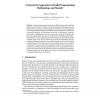Free Online Productivity Tools
i2Speak
i2Symbol
i2OCR
iTex2Img
iWeb2Print
iWeb2Shot
i2Type
iPdf2Split
iPdf2Merge
i2Bopomofo
i2Arabic
i2Style
i2Image
i2PDF
iLatex2Rtf
Sci2ools
121
click to vote
IPPS
1999
IEEE
1999
IEEE
A Structured Approach to Parallel Programming: Methodology and Models
Parallel programming continues to be difficult, despite substantial and ongoing research aimed at making it tractable. Especially dismaying is the gulf between theory and the practical programming. We propose a structured approach to developing parallel programs for problems whose specifications are like those of sequential programs, such that much of the work of development, reasoning, and testing and debugging can be done using familiar sequential techniques and tools. The approach takes the form of a simple model of parallel programming, a methodology for transforming programs in this model into programs for parallel machines based on the ideas of semantics-preserving transformations and programming archetypes (patterns), and an underlying operational model providing a unified framework for reasoning about those transformations that are difficult or impossible to reason about using sequential techniques. This combination of a relatively accessible programming methodology and a sound...
Distributed And Parallel Computing | IPPS 1999 | Parallel Programming | Practical Programming | Sequential Techniques |
Related Content
| Added | 03 Aug 2010 |
| Updated | 03 Aug 2010 |
| Type | Conference |
| Year | 1999 |
| Where | IPPS |
| Authors | Berna L. Massingill |
Comments (0)

